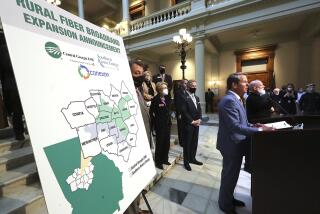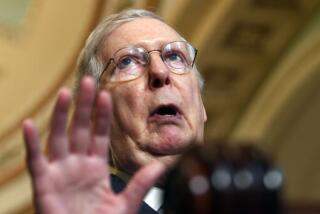States Link Aid Cuts to Defense, Social Security
- Share via
ARLINGTON, Va. — State lawmakers said Saturday that they are willing to accept cuts in federal aid to states if Congress agrees to freeze defense spending at 1985 levels and considers reductions in Social Security spending.
At the conclusion of a three-day session in suburban Washington, the National Conference of State Legislatures said it is unfair for states to absorb an estimated $10 billion in cuts for fiscal 1986 when the Reagan Administration’s $974-billion budget calls for a $30-billion increase in defense spending.
“Defense spending should not be exempt from action taken to reduce the deficit,” the legislators said in a resolution approved Saturday. The group’s budget committee called for a one-year freeze in defense spending “conditional upon . . . a reduction in other federal programs.”
In addition, the lawmakers said, “Social Security, federal retirement and all entitlement programs should be critically evaluated” for possible cuts.
Although the legislators said they “firmly resist” the scope of the proposed budget cuts to the states in a variety of grants and programs, they expressed willingness to “do (our) share in absorbing reductions to reduce the overall budget deficit.”
However, legislators voiced frustration that Congress and the Administration would cite the state surpluses as justification for cutting aid to the states.
“We’re not sitting on a pile of money like some people seem to think,” said Betty Easley, a Florida legislator. “We don’t want to hack away at defense programs, but everyone has to share in the cuts.”
States are projected to have a total surplus of $6 billion at the end of this fiscal year. But legislators say that half of that total is found in only half a dozen states, that many states have little or no surplus and that the surpluses are the result of tax increases and cuts in services three or four years ago.
The legislators did not call for a federal tax increase but said any increase in revenues should be made only as a way to cut the deficit.
“The public does not want a tax increase,” said state Sen. David Nething of North Dakota. “I would hate to see this organization be in the position of trying to mandate that Congress consider a tax increase.”
In other matters, the lawmakers approved a resolution urging Congress to allow the temporary 8-cents-per-pack excise tax on cigarettes to expire as scheduled on Sept. 30. While acknowledging this would cut federal revenues, the conference said excise taxes have traditionally been the domain of states and that “further competition for existing tax bases is inefficient and undesirable.”
More to Read
Get the L.A. Times Politics newsletter
Deeply reported insights into legislation, politics and policy from Sacramento, Washington and beyond. In your inbox three times per week.
You may occasionally receive promotional content from the Los Angeles Times.










